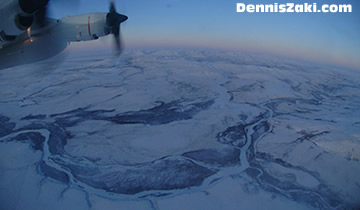[excerpt]
Toward North Corps: Nurturing the Spirit of Inuit Independence while Pre-empting a Movement for Inuit Secession
It's time for a circumpolar North Corps program, modeled on the Peace Corps, to help the Arctic to achieve its full potential
By Barry S. Zellen
Securing the Northern FrontIn the years since the nail-biter of a referendum on Québec separation from the rest of Canada held in 1995, Québec and Anglo-Canada have worked hard to patch up their differences, and on November 22, 2006, Prime Minister Stephen Harper preempted a renewed effort by Québec separatists to assert their enduring nationhood in yet another referendum that would unravel the Canadian confederation, and "surprised the House of Commons . . . by announcing his party wants to recognize Québec as nation within a united Canada," as recalled by CanWest News' Carly Weeks. (See: "Harper Wants to Recognize Québec as Nation within a United Canada," CanWest News Service, November 22, 2006.)

For the moment, the issue of Québec's distinctiveness, and its yearning for independence, seems to have been alleviated, but the perennial nature of this issue, across so many generations, suggests it will inevitably resurface again, and when it does, the role of the Arctic as a potential strategic counter-balance to an independent Québec will have to be assessed, as will its role as part of what Ken Coates et al. have recently described as the re-emerging "Arctic front" as the world community races to exploit the strategic and economic opportunities of a polar thaw. (Ken S. Coates, P. Whitney Lackenbauer, William R. Morrison, and Greg Poelzer, Arctic Front: Defending Canada in the Far North. Toronto: Thomas Allen, 2008.)
In anticipation of a future secessionist threat from Québec or an external challenge to Canada's Arctic sovereignty, a tighter integration of the Inuit homeland with the rest of Anglo-Canada would go far to enhance the bond that unites Canada, north and south, fostering greater loyalty to Canada among the people of the Arctic. This can be achieved by a closer collaboration between Ottawa and Nunavut in their land claims implementation and co-management efforts, and through continued recruitment, training, and deployment of Canadian Rangers that patrol the Arctic coast, engage in surveillance, and assist in search and rescue in partnership with the crown.
But just as the aspiration of Québec to become independent will likely never entirely be extinguished, it is possible that a genuine desire by the Inuit for independence might also emerge. In Greenland, which is one of the world's largest, remotest, and poorest islands, and which within the context of long-term global warming shows many potential attributes of sovereign independence—with its own language, a distinct culture, vast offshore and potential onshore resources—the case for independence, and to end its colonial dependency on Denmark, is indeed compelling.

No comments:
Post a Comment